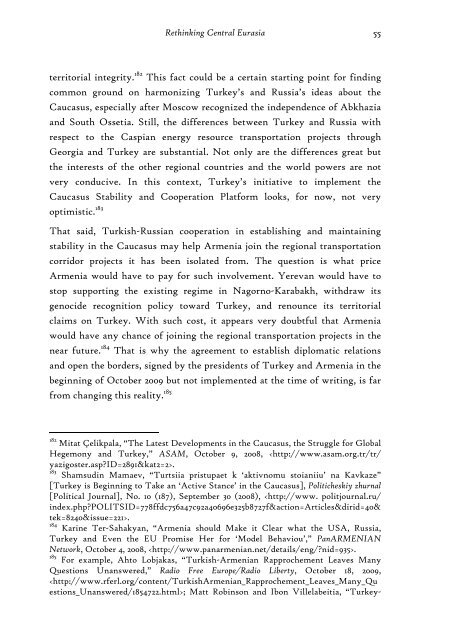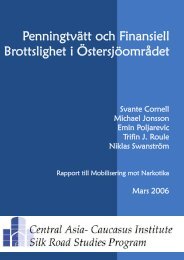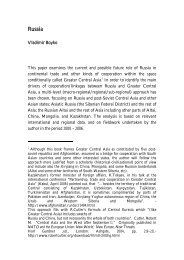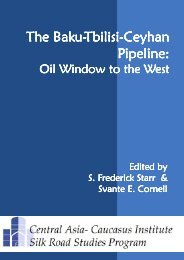Eurasianism and the Concept of Central Caucaso-Asia
Eurasianism and the Concept of Central Caucaso-Asia
Eurasianism and the Concept of Central Caucaso-Asia
Create successful ePaper yourself
Turn your PDF publications into a flip-book with our unique Google optimized e-Paper software.
Rethinking <strong>Central</strong> Eurasia 55<br />
territorial integrity. 182 This fact could be a certain starting point for finding<br />
common ground on harmonizing Turkey’s <strong>and</strong> Russia’s ideas about <strong>the</strong><br />
Caucasus, especially after Moscow recognized <strong>the</strong> independence <strong>of</strong> Abkhazia<br />
<strong>and</strong> South Ossetia. Still, <strong>the</strong> differences between Turkey <strong>and</strong> Russia with<br />
respect to <strong>the</strong> Caspian energy resource transportation projects through<br />
Georgia <strong>and</strong> Turkey are substantial. Not only are <strong>the</strong> differences great but<br />
<strong>the</strong> interests <strong>of</strong> <strong>the</strong> o<strong>the</strong>r regional countries <strong>and</strong> <strong>the</strong> world powers are not<br />
very conducive. In this context, Turkey’s initiative to implement <strong>the</strong><br />
Caucasus Stability <strong>and</strong> Cooperation Platform looks, for now, not very<br />
optimistic. 183<br />
That said, Turkish-Russian cooperation in establishing <strong>and</strong> maintaining<br />
stability in <strong>the</strong> Caucasus may help Armenia join <strong>the</strong> regional transportation<br />
corridor projects it has been isolated from. The question is what price<br />
Armenia would have to pay for such involvement. Yerevan would have to<br />
stop supporting <strong>the</strong> existing regime in Nagorno-Karabakh, withdraw its<br />
genocide recognition policy toward Turkey, <strong>and</strong> renounce its territorial<br />
claims on Turkey. With such cost, it appears very doubtful that Armenia<br />
would have any chance <strong>of</strong> joining <strong>the</strong> regional transportation projects in <strong>the</strong><br />
near future. 184 That is why <strong>the</strong> agreement to establish diplomatic relations<br />
<strong>and</strong> open <strong>the</strong> borders, signed by <strong>the</strong> presidents <strong>of</strong> Turkey <strong>and</strong> Armenia in <strong>the</strong><br />
beginning <strong>of</strong> October 2009 but not implemented at <strong>the</strong> time <strong>of</strong> writing, is far<br />
from changing this reality. 185<br />
182 Mitat Çelikpala, “The Latest Developments in <strong>the</strong> Caucasus, <strong>the</strong> Struggle for Global<br />
Hegemony <strong>and</strong> Turkey,” ASAM, October 9, 2008, .<br />
183 Shamsudin Mamaev, “Turtsiia pristupaet k ‘aktivnomu stoianiiu’ na Kavkaze”<br />
[Turkey is Beginning to Take an ‘Active Stance’ in <strong>the</strong> Caucasus], Politicheskiy zhurnal<br />
[Political Journal], No. 10 (187), September 30 (2008), .<br />
184 Karine Ter-Sahakyan, “Armenia should Make it Clear what <strong>the</strong> USA, Russia,<br />
Turkey <strong>and</strong> Even <strong>the</strong> EU Promise Her for ‘Model Behaviou’,” PanARMENIAN<br />
Network, October 4, 2008, .<br />
185 For example, Ahto Lobjakas, “Turkish-Armenian Rapprochement Leaves Many<br />
Questions Unanswered,” Radio Free Europe/Radio Liberty, October 18, 2009,<br />
; Matt Robinson <strong>and</strong> Ibon Villelabeitia, “Turkey-






